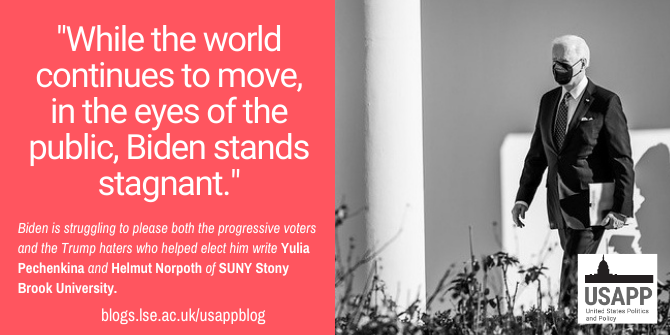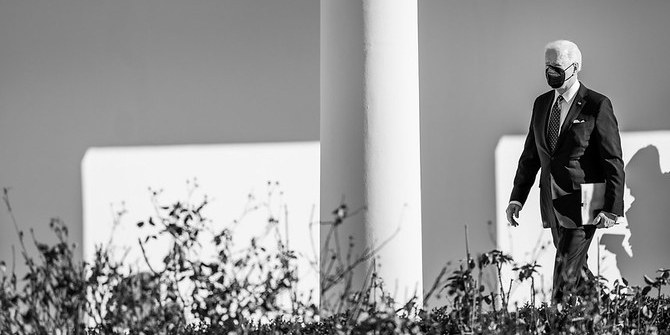
 President Joe Biden’s approval ratings have now been in decline for nearly a year, making him the least popular president at this time in his presidency in 70 years, save for Donald Trump. Yulia Pechenkina and Helmut Norpoth argue that Biden’s falling ratings can be linked to progressive disenchantment with his failures so far to deliver on many of his election promises, and a lack of support from those who voted against Donald Trump rather than for Biden in 2020.
President Joe Biden’s approval ratings have now been in decline for nearly a year, making him the least popular president at this time in his presidency in 70 years, save for Donald Trump. Yulia Pechenkina and Helmut Norpoth argue that Biden’s falling ratings can be linked to progressive disenchantment with his failures so far to deliver on many of his election promises, and a lack of support from those who voted against Donald Trump rather than for Biden in 2020.
As the world is shocked by Russian atrocities in Ukraine, and grapples with the repercussions of sanctions as well as rising inflation, Americans look to their chief executive for comfort and leadership. Or rather, they look for someone to hold responsible for the troubles abroad and within.
President Biden, now in his second year, has a dismal approval rating of just forty-one percent in the latest RealClearPolitics average. Compared to other presidents at that moment of their tenure since Truman, he only surpasses Donald Trump and then just barely. Recent polls administered by Quinnipiac University show that increasing inflation and Biden’s weak response to the conflict between Russia and Ukraine have caused his popularity to decline. However, even prior to recent events, Biden’s popularity has steadily diminished. The blame cannot be solely placed on Republicans, whose backing has been negligible all along. A crucial reason for Biden’s low approval rating rests with the very people who elected him in 2020: those whose expectations have been disappointed and those who cast their ballots simply because hated Trump.
Biden won the 2020 election with the help of young progressive voters. In the 2020 exit poll, seventeen percent were between the ages of eighteen and twenty-nine, and of that pool, sixty percent voted for the Democratic nominee. Biden attracted young and liberal Democrats for two reasons. The first is that he endorsed policies that tended to the concerns of progressives, especially concerning student debt. During his campaign, Biden promoted the ‘Build Back Better’ agenda, a legislative framework tackling a plethora of domestic issues. In the plan, he announced he would make public higher education accessible for all families with incomes below $125,000 and make two-year community colleges tuition-free. Additionally, Biden vowed to cut $10,000 from those suffering from student debt. However, in his tenure so far, he has yet to deliver on those proposals, much to the dismay of students and progressives alike. US Representative Alexandria Ocasio-Cortez, a prominent progressive, has suggested that Biden could increase his rating by canceling a portion of student debt. Nevertheless, at present, many who voted for him are dissatisfied with his passivity in pushing policies that he had promoted while running.
“P20220218AS-0006-3” by The White House is US Government Work.
Trump was voted out
Another reason for Biden’s low approval as president is that many of his voters in 2020 were motivated by strongly negative feelings about Trump rather than by any positive qualities attributed to their chosen candidate. Once Trump was out of office and the spotlight focused on Biden, those voters had little to fall back on to stick with him. A survey conducted by the Pew Research Center found that the top reason Biden supporters made their vote was: “He’s not Trump.” Fifty-six percent of respondents declared that their vote for Biden was a vote against Trump compared to nine percent who cited his policy positions, and just nineteen percent who cited his leadership or temperament. The poll leaves no doubt that Biden’s victory was rooted in extreme aversion against the 2020 incumbent and not in enthusiasm for the challenger.
To be sure, the 2020 election was not the first where a challenger suffered from this predicament. In 2004, it happened to John Kerry running against Republican incumbent George W. Bush. According to a study of what voters liked and disliked about those candidates, the top quality that impressed voters about Kerry was not anything positive about him such as his record in the Senate, honesty, or leadership, but disdain for Bush. It was faint praise for a candidate who was derided as a “flip-flopper” for voting for the war in Iraq before opposing it. Unlike Biden in 2020, though, Kerry was unable to convert disdain for the sitting president into an electoral victory.
The policy agendas of the 2004 and 2020 elections admittedly were quite different. In the wake of 9/11, the war on terrorism, and the Iraq War put foreign policy center stage in the 2004 election. While domestic issues were raised in debates, voter concerns focused on war and peace issues. Following 9/11, Americans rallied around President Bush, who was credited for being a leader and decisive in steering the country through that tragic event. In contrast, domestic issues were at the forefront of the 2020 election. Restless from the pandemic’s societal symptoms and concerned with racial injustice, Americans turned against President Trump. Unlike Bush, Donald Trump failed to unite the country amidst tumultuous events.
While dislike of Trump was a major ingredient for Biden’s victory, this form of back-handed support ironically poses a threat to his standing with the public now that he is in the White House. The country continues to suffer from the COVID-19 ongoing pandemic (despite the rollout of vaccines), rising inflation and now feels the impact of the Russian invasion of Ukraine. Amidst uncertainty, Biden’s fragile support is cracking under the pressure. Without a positive grounding his voters are unlikely to stick with him, and his latest approval ratings are evidence of this. While the world continues to move, in the eyes of the public, Biden stands stagnant. With lukewarm support from the outset and progressive voters becoming disenchanted, the prospect of Democrats winning the midterm elections this year as well as Biden’s own re-election are hanging in the balance.
Please read our comments policy before commenting.
Note: This article gives the views of the author, and not the position of USAPP – American Politics and Policy, nor the London School of Economics.
Shortened URL for this post: https://bit.ly/3OFU1xT
About the authors
 Helmut Norpoth – SUNY Stony Brook University
Helmut Norpoth – SUNY Stony Brook University
Helmut Norpoth is professor of political science at Stony Brook University. He is co-author of The American Voter Revisited and has published widely on topics of electoral behavior. His current research focuses on public opinion and elections in wartime.
 Yulia Pechenkina – SUNY Stony Brook University
Yulia Pechenkina – SUNY Stony Brook University
Yulia Pechenkina is a Queens local whose passions lie in the political sphere and its intersection with public life. She is a political science major with a focus on American Government, Law, and Public Policy at SUNY Stony Brook University and is additionally pursuing a minor in history. Previously, she interned as a policy research intern for NY State Senator John E. Brooks. There she collaborated on a policy proposal that sought to establish legal programs to provide assistance in upgrading the discharge status of LGBT veterans and other than honorably discharged veterans.





This excellent essay gives some reasons why President Joe Biden is losing popular support. But there is more to consider besides his “passivity,” and failure to please progressives. The polls don’t show it yet, but history will show that the “Do Nothing” President Joe Biden is worse than the passive, poker loving president, Warren G. Harding.
Biden could have prevented the War in Ukraine by promising Putin that NATO would not take in Ukraine. Instead, his Military Industrial Complex advisors saw an opportunity to make millions off the conflict. So Biden played “cutesy” and said joining NATO was up to Ukraine. I.e., let the invasion happen, there is Money to be Made!
Thus letting the Arms Industry profiteer from the Ukraine War matches Tea Pot Dome for corruption. While neither Biden nor Harding were bad men, their presidencies lend proof to the old saw, “Let ‘good’ men do nothing, and evil will prevail.”
William J. Kelleher, Ph.D.
@InterpretivePo1